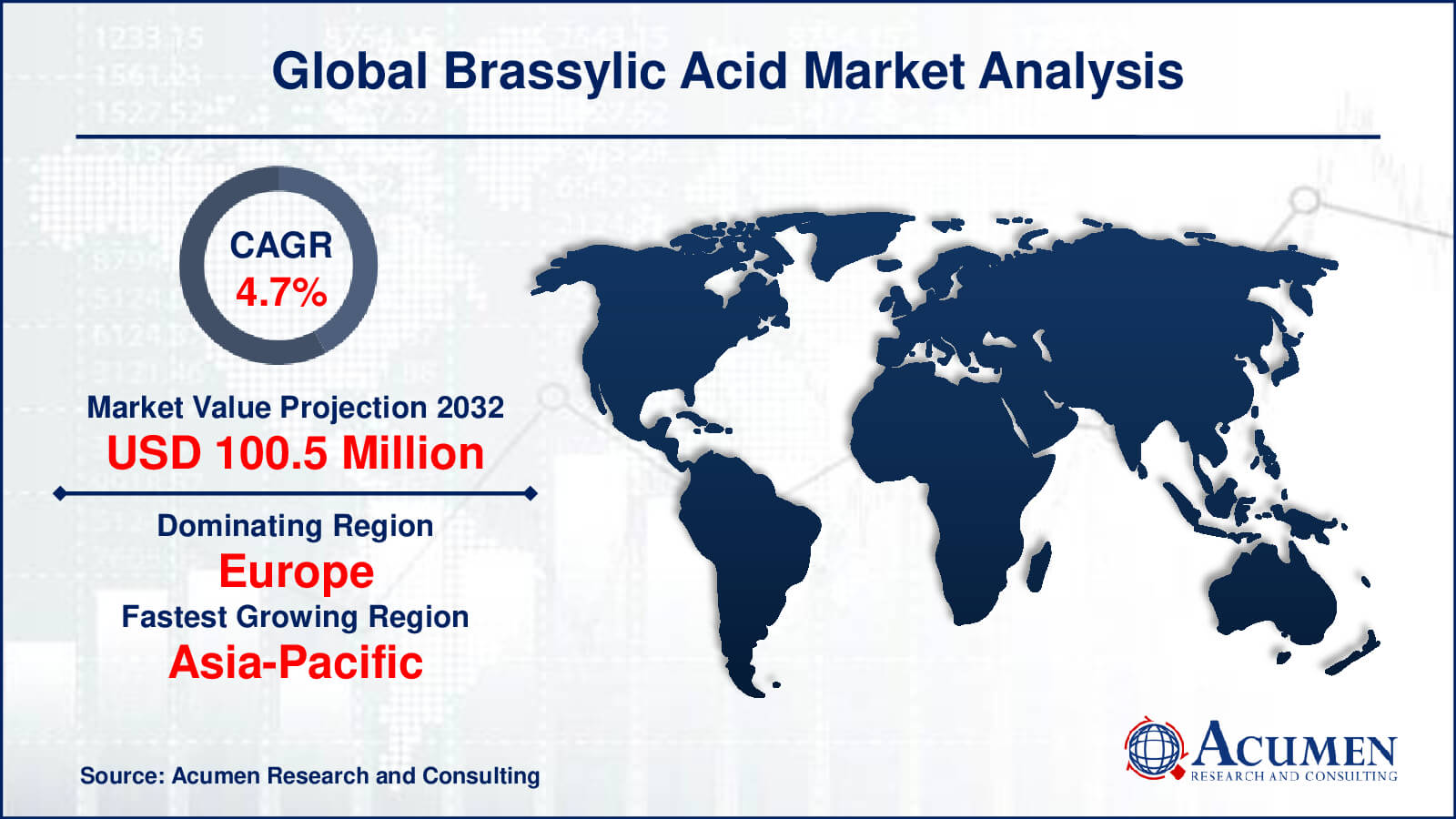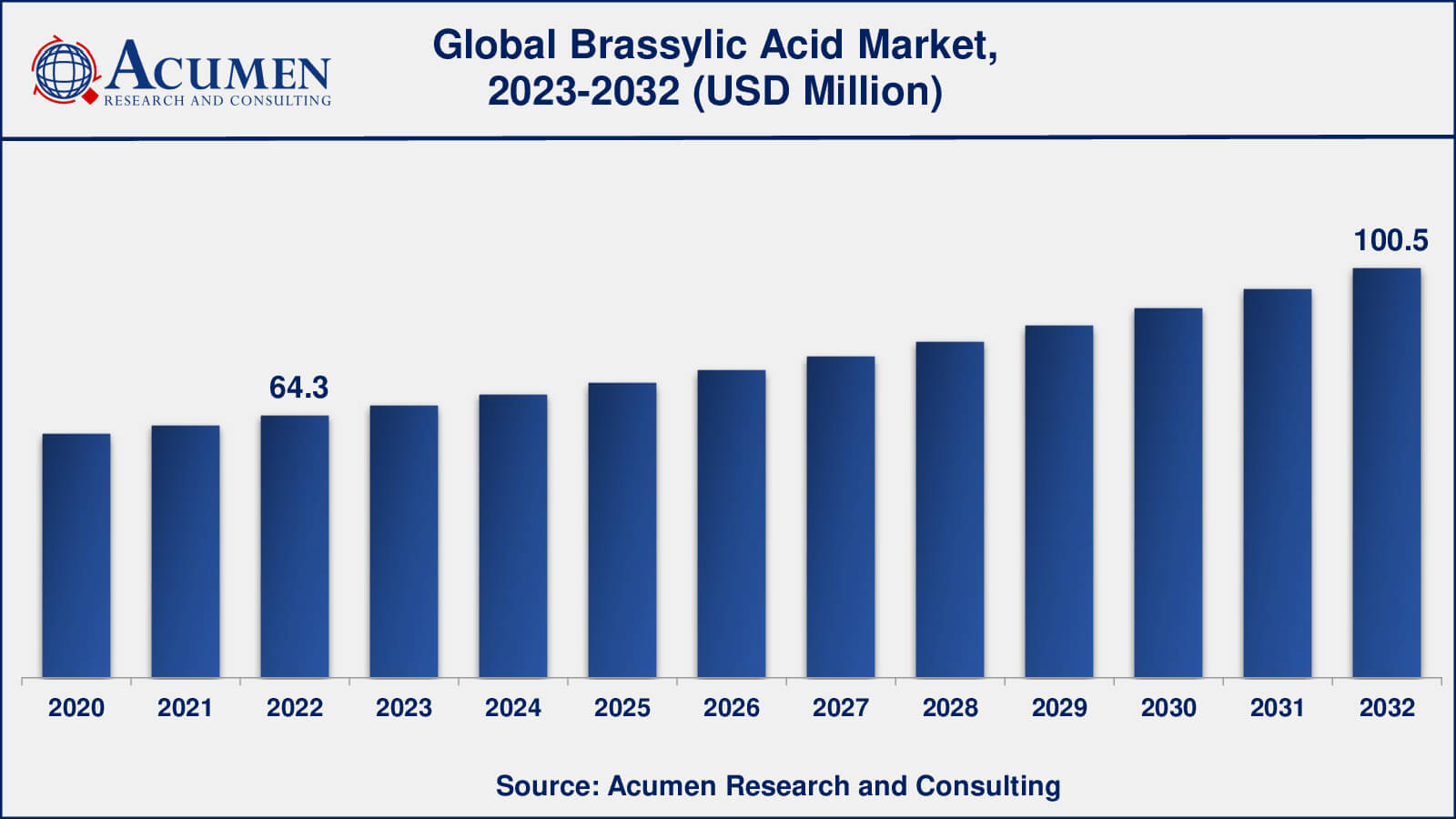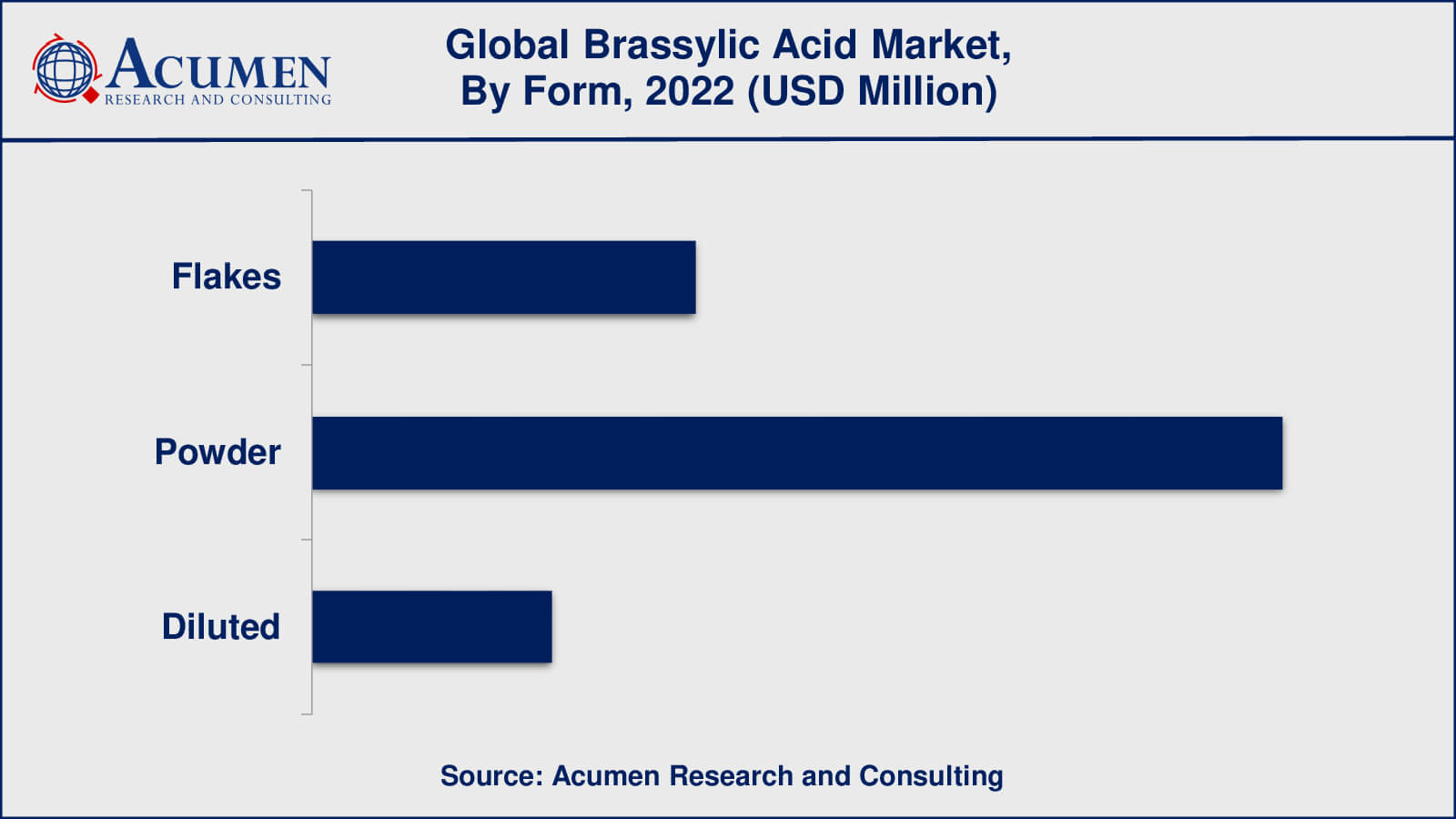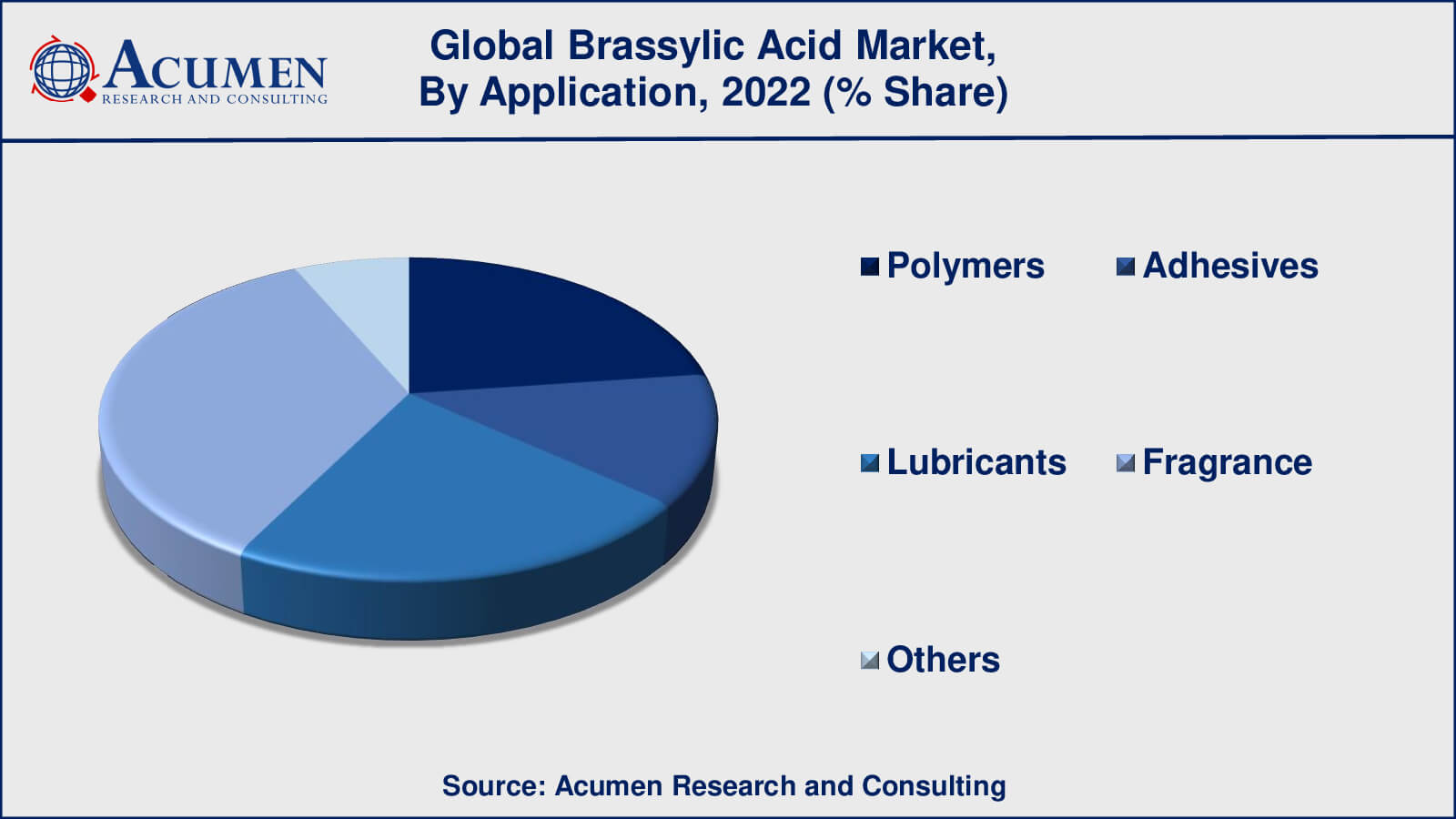Brassylic Acid Market Size - Global Industry, Share, Analysis, Trends and Forecast 2023 - 2032
Published :
Report ID:
Pages :
Format :
Brassylic Acid Market Size - Global Industry, Share, Analysis, Trends and Forecast 2023 - 2032
Report Coverage
- Industry Dynamics
- Market Size and Forecast Data
- Segment Analysis
- Competitive Landscape
- Regional Analysis with a Niche Focus on Country-Level Data
- High Level Analysis - Porter's, PESTEL, Value Chain, etc.
- Company Profiles of Key Players
- Option to Customize the Report As Per Your Specific Need
Request Sample Report
The global Brassylic Acid Market size was valued at USD 64.3 Million in 2022 and is projected to attain USD 100.5 Million by 2032 mounting at a CAGR of 4.7% from 2023 to 2032.
Brassylic Acid Market Highlights
- Global brassylic acid market revenue is poised to garner USD 100.5 million by 2032 with a CAGR of 4.7% from 2023 to 2032
- Europe brassylic acid market value occupied around USD 24.4 million in 2022
- Asia-Pacific brassylic acid market growth will record a CAGR of more than 5% from 2023 to 2032
- Among form, the powder sub-segment occupied over US$ 39.2 million revenue in 2022
- Based on application, the fragrance sub-segment gathered around 35% share in 2022
- Rising demand for eco-friendly polymers and materials is a popular brassylic acid market trend that drives the industry demand

Brassylic acid is a chemical compound having the formula C9H4(COOH)8. It belongs to the dicarboxylic acid family, which means it has two carboxylic acid functional groups. Because it was isolated from mustard seeds in 1822, the acid is called after the brassica plant family, which includes vegetables such as cabbage and broccoli. Brassylic acid is a white, crystalline substance that is only very little soluble in water. Brassylic acid is used extensively in the production of different polymers, notably polyesters. It is a useful monomer because of its many carboxylic acid groups, which may be esterified with alcohol monomers to generate long-chain polymers. These polymers have desired features such excellent temperature stability and mechanical strength, which makes them useful for coatings, adhesives, and engineering plastics.
Brassylic acid and its derivatives are also used in the manufacture of specialty chemicals and medicines. It may be transformed into other valuable chemicals by chemical transformations, boosting its applicability in several sectors. This versatile chemical is being researched for new potential uses in both industrial and Fragrance contexts. Overall, brassylic acid is important in the fields of chemistry and materials science, acting as a starting material for many chemical processes and playing an important role in the production of polymers. Its distinct structure and qualities continue to pique the interest of scientists and engineers, opening the path for creative advances in materials and chemical technology.

Global Brassylic Acid Market Dynamics
Market Drivers
- Growing demand for polyesters and engineering plastics in various industries
- Increasing focus on sustainable and bio-based materials
- Advancements in extraction and purification technologies
- Rapid industrialization and infrastructural development in emerging markets
Market Restraints
- Fluctuations in raw material availability and pricing
- Intense competition within the chemical industry
- Stringent environmental regulations and waste management requirements
Market Opportunities
- Exploration of new applications in specialty chemicals and pharmaceuticals
- Innovations in brassylic acid derivatives for fragrance and perfumery applications
Brassylic Acid Market Report Coverage
| Market | Brassylic Acid Market |
| Brassylic Acid Market Size 2022 | USD 64.3 Million |
| Brassylic Acid Market Forecast 2032 | USD 100.5 Million |
| Brassylic Acid Market CAGR During 2023 - 2032 | 4.7% |
| Brassylic Acid Market Analysis Period | 2020 - 2032 |
| Brassylic Acid Market Base Year | 2022 |
| Brassylic Acid Market Forecast Data | 2023 - 2032 |
| Segments Covered | By Form, By Application, And By Geography |
| Regional Scope | North America, Europe, Asia Pacific, Latin America, and Middle East & Africa |
| Key Companies Profiled | Beyo Chemical Co., Ltd., Cathay Industrial Biotech, Evonik Industries, Larodan Ab, Nantong Senos Biotechnology Co., Ltd., Palmary Chemical, Shanghai Kaleys Holding Co., Ltd., Unisource Chemicals Pvt. Ltd., and Zibo Guangtong Chemical Co., Ltd. |
| Report Coverage |
Market Trends, Drivers, Restraints, Competitive Analysis, Player Profiling, Covid-19 Analysis, Regulation Analysis |
Brassylic Acid Market Insights
Several variables influence the brassylic acid market dynamics, including demand, production, and pricing. The growing need for polyesters and engineering plastics in industries such as automotive, electronics, and packaging is a crucial driver. Because of its position as a critical monomer in polyester manufacturing, brassylic acid is a crucial element in addressing these needs.
Furthermore, the increased emphasis on environmentally friendly and sustainable materials has fueled research into bio-based polymers. Brassylic acid, which is generated from renewable sources such as vegetable oils, falls into this category and has gained interest as a potential green alternative to typical petrochemical-based monomers. This trend has the potential to grow the brassylic acid industry in the future.
The brassylic acid market is also influenced by the availability and pricing of raw materials. Because it is largely derived from natural oils, changes in the costs and supplies of these feedstocks can have an impact on the overall cost of brassylic acid. Furthermore, developments in extraction and purification technologies can help to reduce manufacturing costs and provide a robust supply chain.
The brassylic acid market is also influenced by global economic circumstances and industrial expansion. Economic downturns can diminish demand for a variety of end-use items, including brassylic acid in polymer synthesis. Rapid industrialization and expanding infrastructure development in emerging economies, on the other hand, may open up new potential for the use of brassylic acid in a variety of applications.
In addition, the chemical industry's competitive landscape and the availability of alternative monomers might impact demand for brassylic acid. Manufacturers are always striving to develop more cost-effective and efficient polymer production methods, and the choice of monomers can have an impact on the overall competitiveness of the end product.
The brassylic acid market is also influenced by government rules and policies governing chemical manufacture, environmental standards, and waste management. Environmental rules may force enterprises to adopt more sustainable practices, which may increase demand for bio-based monomers such as brassylic acid.
In conclusion, the brassylic acid market dynamics are influenced by factors such as polyester and engineering plastics demand, the push for sustainable materials, raw material availability and pricing, economic conditions, chemical industry competition, and government regulations. These variables will interact to influence the growth and direction of the brassylic acid market in the coming years.
Brassylic Acid Market Segmentation
The worldwide market for brassylic acid is split based on form, application, and geography.
Brassylic Acid Forms
- Flakes
- Powder
- Diluted

According to the brassylic acid industry analysis, the powder form of brassylic acid, like other forms such as flakes and diluted solutions, is projected to play an important role in the chemical and polymer sectors. The powder form has particular advantages, such as ease of handling, precise dosing, and improved stability, making it a favoured choice for a variety of production processes. Because of its flexibility in synthesising many types of polyesters and specialised chemicals, it is an important component in the creation of coatings, adhesives, fibres, and engineering plastics. Factors such as the general expansion of sectors reliant on polyesters, improvements in polymer technology, and the advent of eco-friendly and sustainable materials may impact demand for brassylic acid in powder form.
Brassylic Acid Applications
- Polymers
- Adhesives
- Lubricants
- Fragrance
- Others

According to the brassylic acid market estimate, the fragrance application is predicted to produce a large market share from 2023 to 2032. Brassylic acid, a dicarboxylic acid with a distinct chemical structure, has the potential to benefit the fragrance industry in a variety of ways. Aromatic compounds generated from carboxylic acids can have distinct aroma properties, which appeals to perfumers and fragrance formulators.
Brassylic acid derivatives might be used as a starting point for the production of certain esters and aroma compounds in fragrance applications. Esters are often utilised in perfumery because of their pleasant and distinct odours. Esters with unique smell characteristics can be created by mixing brassylic acid with alcohol-derived aroma components.
Brassylic acid derivatives might also be used as fixatives or enhancers in aroma compositions. Fixatives are substances that aid in the stabilisation and prolongation of the smell of a perfume or cologne on the skin or other surfaces, whilst enhancers can change or heighten certain fragrance notes.
Brassylic Acid Market Regional Outlook
North America
- U.S.
- Canada
Europe
- U.K.
- Germany
- France
- Spain
- Rest of Europe
Asia-Pacific
- India
- Japan
- China
- Australia
- South Korea
- Rest of Asia-Pacific
Latin America
- Brazil
- Mexico
- Rest of Latin America
The Middle East & Africa
- South Africa
- GCC Countries
- Rest of the Middle East & Africa (ME&A)
Brassylic Acid Market Regional Analysis
Brassylic acid is also widely used in the polymer sector in European nations. The region's severe chemical manufacturing and environmental laws may impact the adoption of sustainable and green products, opening up chances for bio-based monomers like brassylic acid.
The North American region, which includes the United States and Canada, is expected to have a considerable influence on the brassylic acid market due to its strong presence in numerous industries such as coatings, adhesives, and plastics. The region's emphasis on environmentally friendly and sustainable materials may stimulate demand for bio-based monomers such as brassylic acid.
The Asia-Pacific region, including countries like China, India, Japan, and South Korea, is expected to play a significant role in the brassylic acid market due to its rapid industrialization and infrastructural development. Polymer demand in the construction, automotive, and packaging industries might fuel market expansion in this area.
Brassylic Acid Market Players
Some of the top brassylic acid companies offered in our report include Beyo Chemical Co., Ltd., Cathay Industrial Biotech, Evonik Industries, Larodan Ab, Nantong Senos Biotechnology Co., Ltd., Palmary Chemical, Shanghai Kaleys Holding Co., Ltd., Unisource Chemicals Pvt. Ltd., and Zibo Guangtong Chemical Co., Ltd.
Frequently Asked Questions
What was the size of the global brassylic acid market in 2022?
The size of brassylic acid market was USD 64.3 million in 2022.
What is the brassylic acid market CAGR from 2023 to 2032?
The brassylic acid market CAGR during the analysis period of 2023 to 2032 is 4.7%.
Which are the key players in the brassylic acid market?
The key players operating in the global brassylic acid market are including Beyo Chemical Co., Ltd., Cathay Industrial Biotech, Evonik Industries, Larodan Ab, Nantong Senos Biotechnology Co., Ltd., Palmary Chemical, Shanghai Kaleys Holding Co., Ltd., Unisource Chemicals Pvt. Ltd., and Zibo Guangtong Chemical Co., Ltd.
Which region dominated the global brassylic acid market share?
Europe region held the dominating position in brassylic acid industry during the analysis period of 2023 to 2032.
Which region registered fastest CAGR from 2023 to 2032?
Asia-Pacific region exhibited fastest growing CAGR for market of brassylic acid during the analysis period of 2023 to 2032.
What are the current trends in the global brassylic acid industry?
The current trends and dynamics in the brassylic acid industry include growing demand for polyesters and engineering plastics in various industries, increasing focus on sustainable and bio-based materials, and advancements in extraction and purification technologies
Which form held the maximum share in 2022?
The powder form held the maximum share of the brassylic acid industry.?



